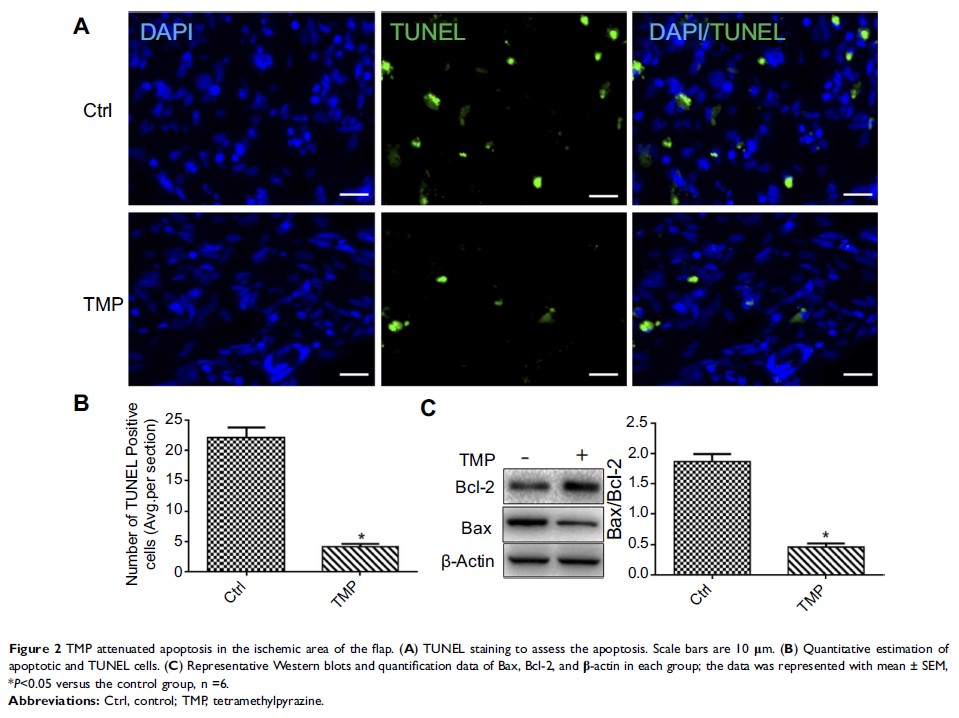9 1 2 3 6
论文已发表
注册即可获取德孚的最新动态
IF 收录期刊
- 2.6 Breast Cancer (Dove Med Press)
- 3.9 Clin Epidemiol
- 3.3 Cancer Manag Res
- 3.9 Infect Drug Resist
- 3.6 Clin Interv Aging
- 4.8 Drug Des Dev Ther
- 2.8 Int J Chronic Obstr
- 8.0 Int J Nanomed
- 2.3 Int J Women's Health
- 3.2 Neuropsych Dis Treat
- 4.0 OncoTargets Ther
- 2.2 Patient Prefer Adher
- 2.8 Ther Clin Risk Manag
- 2.7 J Pain Res
- 3.3 Diabet Metab Synd Ob
- 4.3 Psychol Res Behav Ma
- 3.4 Nat Sci Sleep
- 1.9 Pharmgenomics Pers Med
- 3.5 Risk Manag Healthc Policy
- 4.5 J Inflamm Res
- 2.3 Int J Gen Med
- 4.1 J Hepatocell Carcinoma
- 3.2 J Asthma Allergy
- 2.3 Clin Cosmet Investig Dermatol
- 3.3 J Multidiscip Healthc

川芎嗪通过诱导血管生成和经由 Akt/Nrf2 通路抑制细胞凋亡,改善多区域穿支皮瓣的存活率
Authors Qing L, Wu P, Zhou Z, Yu F, Tang J
Received 18 November 2018
Accepted for publication 6 March 2019
Published 1 May 2019 Volume 2019:13 Pages 1437—1447
DOI https://doi.org/10.2147/DDDT.S195090
Checked for plagiarism Yes
Review by Single-blind
Peer reviewers approved by Dr Colin Mak
Peer reviewer comments 3
Editor who approved publication: Professor Manfred Ogris
Background: Multiterritory
perforator flaps were commonly designed to cover the large soft-tissue defects
in reconstructive surgery. But the high risk of partial necrosis in the distal
portion of the flaps hindered their clinical application. The purpose of this
study was to evaluate the effects of tetramethylpyrazine (TMP) on the survival
of the multiterritory perforator flaps and to explore the underlying mechanism.
Materials and methods: Seventy-two
Sprague–Dawley rats underwent multiterritory perforator flap procedure and were
divided into three groups with 24 each. Flap survival and water content were
measured, and the area of angiogenesis and apoptosis in the ischemia skin flaps
were assessed on the postoperative day 7. The expressions of angiogenesis-related
protein VEGF and apoptosis-related protein Bax, Bcl-2 in each group were
detected by Western blotting, which also had been used to assess the
expressions levels of Akt, p-Akt, and Nrf2.
Results: Following
TMP treatment, the survival area and number of microvessels presented in the
skin flaps increased and tissue edema reduced on postoperative day 7. The
expressions of angiogenesis-related protein VEGF increased in the TMP treatment
group than in the control group. In addition, compared with the control group,
TMP inhibited apoptosis, and increased the expression levels of p-Akt, Nrf2 in
the areas of ischemia. These effects were reversed by an Akt protein inhibitor
LY294002. Similarly, treatment with LY294002 inhibited TMP induced by interfering
the Akt/Nrf2 signaling pathway.
Conclusion: These
results illustrated that TMP could promote the survival of multiterritory
perforator flaps by enhancing angiogenesis and attenuating apoptosis. These
were involved in Akt/Nrf2 signaling pathway.
Keywords: perforator
flaps, tetramethylpyrazine, apoptosis, angiogenesis, Akt/Nrf2 signaling pathway
